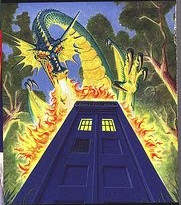
The current series of
Doctor Who is self-consciously styling itself as a “dark fairytale”, even to the point of having characters describe it as such within the stories.
Terry Pratchett recently criticised Doctor Who as not being science fiction.
This got me thinking – is it possible to tell a story that is both fairy tale and science fiction, or are the two genres fundamentally different in approach? Can Doctor Who ever really be both, or is it just a fairy-tale with science fiction trappings, or science-fiction in fairy-tale garb?
The third of Arthur C Clarke’s Laws of Prediction states:
“Any sufficiently advanced technology is indistinguishable from magic”
This is sometimes used by science fiction writers as an excuse to introduce the impossible without any kind of attempt at explanation or justification. Arthur C Clarke used it to criticise a lack of imagination when it came to predicting the future, and I don’t have any argument with that.
But what I do think is very different is how magic in fairy-tales and technology in science-fiction typically operate. In the traditional fairy-tale, magic is encountered by humans, commonly given as a gift or reward, rather than being exercised by them. Jack unknowningly trades his cow for magic beans; he doesn’t magically engineer them to grow a giant beanstalk.
Technology, however, typically operates in an attitude of control over nature. So while magic and technology might appear similar in that they can both be extraordinary and seemingly inexplicable, they operate in a very different spirit.
This distinction doesn’t hold true for all kinds of magic, of course. There are many stories of magicians who try to use magic simply as an exercise of power, and this is particularly true of modern fantasy. Harry Potter is a prime example of magic simply as substitute-technology – or as the wizards see it, technology is Muggles’ substitute for magic. In any case, the two are interchangeable in J K Rowling’s writing in a way that isn’t generally true of fairy-tales proper.
In writing my current novel, I’ve given a lot of thought to the nature of magic. I try to draw a distinction in it between magic as “Art” and magic as “Power”. It’s not the case that one is good and the other is bad, but I think that a cultivated dominion over nature carries with it temptations and dangers.
In doing this, I’m elaborating on some of the ideas suggested by Galadriel’s discussion of magic with Sam Gamgee in Tolkien’s The Lord of the Rings:
“And you?” she said, turning to Sam. “For this is what you folk would call magic, I believe; though I do not understand clearly what they mean; and they seem to use the same word for the deceits of the Enemy. But this, if you will, is the magic of Galadriel. Did you not say that you wished to see Elf-magic?”
I think this is one of the interesting things that the use of magic in literature can do – raise questions of art and technology, of power and its abuse. What do you think?




